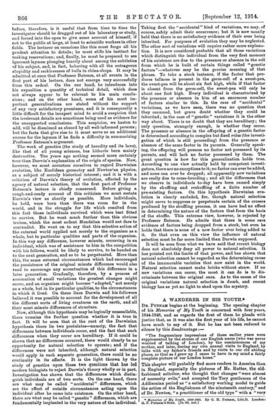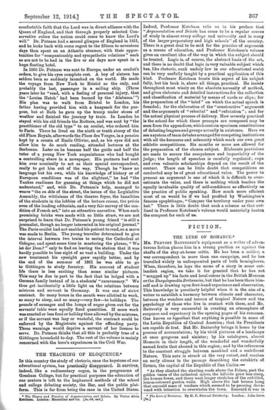A WANDERER IN HIS YOUTH.* DB. Pumut begins at the
beginning. The opening chapter of his Memories of My Youth is concerned with four years, 1844-1848, and as regards the first of them he pleads with justice that, as it was also the first year of his life, he cannot have much to say of it. But he has not been reduced to silence by this disadvantage :- "The fragmentary impressions of these earlier years were supplemented by the stories of our English nurse (who was never wearied of talking of London), by the reminiscences of my mother, and later, during my own annual visits to England, by talks with my father's friends and by visits to our old abiding places, so that as I grew up I came to have in my mind a fairly complete picture of our London home."
This chapter will probably find more readers in America than in England, especially the pictures of Mr. Rutter, the old- fashioned solicitor, who thought that changes " were almost of necessity evils," and accepted the Tory gentleman of the Addisonian period as " a satisfactory working model to guide the action of the Englishman of the nineteenth century," and of Dr. Newton, "a practitioner of the old type " with a "very • Mentories of My Youth, 1844-18135. By G. H. Putnam, Litt.D. London: G. P. Putnam.. sons. [78.6d. net.1
comfortable faith that the Lord was in direct alliance with the Queen of England, and that through properly selected Con- servative rulers the nation could come to know the Lord's will." Dr. Putnam had a second glimpse of England in 1851, and he looks back with some regret to the fifteen to seventeen days then spent on an Atlantic steamer, with their oppor- tunities for "companionship and sympathetic relations" such as are not to be had in the five or six days now spent in a huge floating hotel.
In 1860 Dr. Putnam was sent to Europe, under an oculist's orders, to give his eyes complete rest. A boy of sixteen has seldom been so suddenly launched on the world. He made the voyage from New York to Bristol as the only, and probably the last, passenger in a sailing ship. (Three years later he "read, with a feeling of personal injury, that the Louisa Hatch' had been burned by the Alabama.' ") His plan was to walk from Bristol to London, his father having provided him with a knapsack for the pur- pose, but at Bath he gave up the tramp under stress of weather and finished the journey by train. In London he stayed with his old friends the Rutters, and was sent by "the practitioner of the old type" to an oculist, who ordered him to Paris. There he lived on the ninth or tenth storey of the old Place Royale, afterwards the Place des Vosges, in a pension kept by a cousin of Emile 011ivier, and, as his eyes did not allow him to do much reading, attended lectures at the Sorbonne. Later on he became half the guide and half the tutor of a young New York acquaintance who had bought a controlling share in a newspaper. His partners had sent him over nominally to act as their special correspondent, really to get him out of the way. Though he "knew no language but his own, while his knowledge of history or of European conditions was of the slightest," he had "the Yankee readiness for guessing at things which be did not understand," and, with Dr. Putnam's help, managed to weave "the on dite of the street, the issues of the Legislative Assembly, the witticisms of the theatre foyer, the banalities of the students in the lobbies of the lecture rooms, the precis even of the leading editorials, and a very fair survey of the con- dition of French art," into an attractive narrative. When such promising bricks were made with so little straw, we are not surprised to learn that Dr. Putnam's young friend "is still a journalist, though no longer interested in his original journal." The Paris oculist had not enabled his patient to read, so a move was made to Berlin. The young traveller determined to give the interval between two trains to seeing the Cathedral at Cologne, and spent some time in mastering the phrase, " Wo ist der Dom ?" only to find on leaving the station that it was hardly possible to lose sight of so vast a building. Under the new treatment his eyesight grew rapidly better, and by the end of the summer of 1861 he was able to go to Gottingen to study forestry. His account of student life there is less exciting than some similar pictures. This may be due in part to the fact that he lodged with a German family instead of in a students' "caravansary." We thus get incidentally a little light on the relations between mistress and servant in Germany. It was one of strict contract. So many hours in the month were allotted to work, so many to sleep, and so many—very few—to holidays. The pounds of sausages and the lumps of sugar given out for the servants' table were equally fixed quantities. If more work was exacted or less food or holiday time allowed by the mistress, or if the servant was lazy or wasteful, the contract could be enforced by the Magistrate against the offending party. Three warnings would deprive a servant of her licence to serve. Dr. Putnam thinks that all this is probably true of a Gottingen household to-day. The rest of the volume is mainly concerned with the hero's experiences in the Civil War.



































 Previous page
Previous page